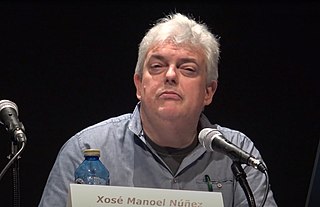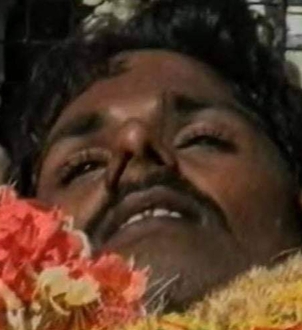
A society is a group of individuals involved in persistent social interaction or a large social group sharing the same spatial or social territory, typically subject to the same political authority and dominant cultural expectations. Societies are characterized by patterns of relationships between individuals who share a distinctive culture and institutions; a given society may be described as the sum total of such relationships among its constituent members.

La Vía Campesina is an international farmers organization founded in 1993 in Mons, Belgium, formed by 182 organisations in 81 countries, and describing itself as "an international movement which coordinates peasant organizations of small and middle-scale producers, agricultural workers, rural women, and indigenous communities from Asia, Africa, America, and Europe".
Women's studies is an academic field that draws on feminist and interdisciplinary methods to place women's lives and experiences at the center of study, while examining social and cultural constructs of gender; systems of privilege and oppression; and the relationships between power and gender as they intersect with other identities and social locations such as race, sexual orientation, socio-economic class, and disability.
Michael J. Watts is Professor Emeritus of Geography at the University of California, Berkeley. He retired in 2016. He is a leading critical intellectual figure of the academic left.

The Landless Workers' Movement is a social movement in Brazil aimed at land reform. Inspired by Marxism, it is one of the largest such movements in Latin America, with an estimated informal membership of 1.5 million across 23 of Brazil's 26 states.
Paezan may be any of several hypothetical or obsolete language-family proposals of Colombia and Ecuador named after the Paez language.
Global feminism is a feminist theory closely aligned with post-colonial theory and postcolonial feminism. It concerns itself primarily with the forward movement of women's rights on a global scale. Using different historical lenses from the legacy of colonialism, global feminists adopt global causes and start movements which seek to dismantle what they argue are the currently predominant structures of global patriarchy. Global feminism is also known as world feminism and international feminism.
Amrita Basu is an American academic and political scientist. She currently is a professor at Amherst College where she holds affiliations in the departments of Political Science, Sexuality, Women's, & Gender Studies, Asian Languages & Civilizations, and Black Studies.
Mitchell A. Seligson is the Centennial Professor of Political Science and Professor of Sociology at Vanderbilt University. He founded and is Senior Advisor to the Latin American Public Opinion Project (LAPOP), which conducts the AmericasBarometer surveys that currently cover 27 countries in the Americas. Seligson has published many books and papers on political science topics. He was elected to membership in the General Assembly of the Inter-American Institute of Human Rights in 2011.
Anthony Bebbington is a geographer, International Director for Natural Resources and Climate Change at the Ford Foundation and Higgins Professor of Environment and Society in the Graduate School of Geography, Clark University, USA. He was previously ARC Laureate Professor at the School of Geography, University of Melbourne, Australia (2016-2019).

Marcia Claire Inhorn is a medical anthropologist and William K. Lanman Jr. Professor of Anthropology and International Affairs at Yale University where she is Chair of the Council on Middle East Studies. A specialist on Middle Eastern gender and health issues, Inhorn conducts research on the social impact of infertility and assisted reproductive technologies in Egypt, Lebanon, the United Arab Emirates, and Arab America. She has also completed a major study of egg freezing in the United States, described in her book Motherhood on Ice: The Mating Gap and Why Women Freeze Their Eggs. Inhorn has published 21 books and more than 200 articles and book chapters.
The Journal of Peasant Studies, subtitled Critical Perspectives on Rural Politics and Development, is a bimonthly peer-reviewed academic journal covering research into the social structures, institutions, actors, and processes of change in the rural areas of the developing world. It is published by Routledge and the editor-in-chief is Saturnino "Jun" Borras Jr..
Albert James Bergesen is an American sociologist and Professor and Head of the Department of Sociology at University of Arizona. He is also a Professor of Government and Public Policy, and Professor of Sociology in the McGuire Center for Entrepreneurship, at the Eller College of Management. He has published three books, edited five anthologies, authored hundreds of articles, and is cited in numerous fields, such as collective violence, international relations, world-systems analysis, environmental sociology, cultural sociology and organizational sociology.
Ruth Hall is a professor at PLAAS at the University of the Western Cape, which she joined in 2002. A political scientist by training, she specialises in the politics and the political economy of agrarian reform, land redistribution, and poverty.
Amita Baviskar is a sociologist and Professor of Environmental Studies and Sociology & Anthropology at Ashoka University, India. Previously, she was Professor at the Sociology Unit, Institute of Economic Growth, Delhi, India. She received the 2005 Malcolm Adiseshiah Award for Distinguished Contributions to Development Studies, the 2008 VKRV Rao Prize for Social Science Research and, in 2010, was awarded the Infosys Prize for Social Sciences – Sociology in recognition of her analysis of social and environmental movements in modern India. Baviskar studies the cultural politics of environment and development in rural and urban India.

Xosé Manoel Núñez Seixas is a Spanish historian who specializes in nationalism studies, the cultural history of war and violence, and migration studies.
Shirley Campbell Barr is a Costa Rican anthropologist, activist and poet. Her poetic works give voice to her activism set on empowering black women and encouraging them to establish their place in history. Her poem Rotundamente negra has become a symbol for women in the Afro-descendant women's movements in Latin American for its self-affirming pro-black message.

Environmental conflicts, socio-environmental conflict or ecological distribution conflicts (EDCs) are social conflicts caused by environmental degradation or by unequal distribution of environmental resources. The Environmental Justice Atlas documented 3,100 environmental conflicts worldwide as of April 2020 and emphasised that many more conflicts remained undocumented.

Extraterritorial Obligations (ETOs) are obligations in relation to the acts and omissions of a state, within or beyond its territory, that have effects on the enjoyment of human rights outside of that state's territory.

Nilesh Mohan Naik was an Indian environmental activist and farmworker belonging to the scheduled tribe community. He was shot to death during the Nylon 6,6 agitation at Keri plateau, Ponda. He is popularly known as Goa's first environmental martyr.







